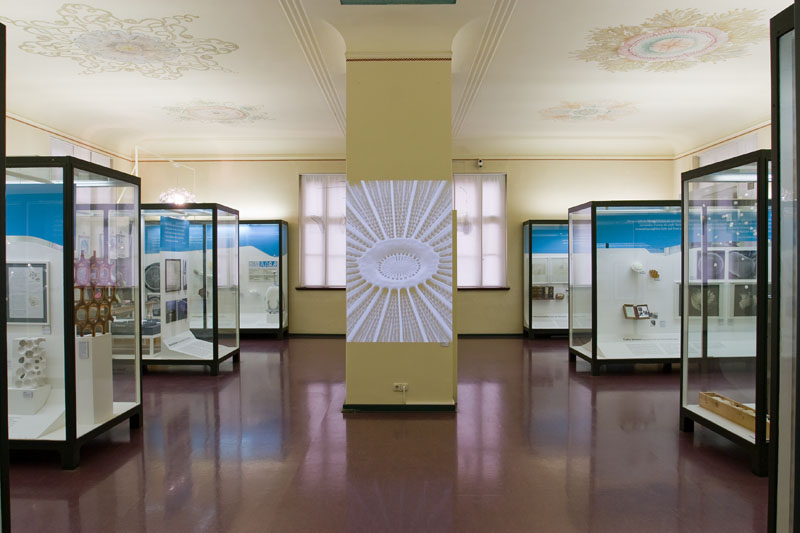A special exhibition of the Phyletisches Museum Jena and the Bauhaus-University Weimar
http://www.diatomeen-ausstellung.de
funded by the Bauhaus-University’s Kreativfonds
Exhibition catalogue available now for EUR 5,-- Please order your personal copy via Felix Sattler
Synopsis
Diatoms are unicellular algae which feature stunningly shaped exosceletons made of silica. “Diatoms – Forming Sense” is a survey on the constructive understanding of diatoms’ morphology in biology, architecture, craft, art, design and engineering. Rather than being a spectacular bionics showcase, the exhibition aimes at questioning the interrelation of beauty and function and its relevance for both scientific research as well as for artistic practice.
“Diatoms – Forming Sense” is composed of
- eight showcases containing eleven exhibition chapters,
- four workplace installations each with video interviews and a small reference library and other interactive elements
- an interactive installation
Exhibits include
- original taxonomic drawings and plates by the founder of microbiology, C.G. Ehrenberg
- original drawings and sketches by German architect Frei Otto
- 19th diatom preparations and exhibition slides
- Scientific and modernist art microphotographs
- Architectural models and form finding studies
- Bionic prototypes and lifestyle products
- Generative video artwork
Exhibition Chapters
- Please note that English titles as well as short descriptions are provisional translations used only here for explanation and not displayed in the exhibition!
- F.A.Q Kleines Lexikon der Diatomeenkunde
- F.A.Q A basic dictionary of diatom biology
- Im Anfang war… Das Rätsel der Form
- In the beginning there was… The mystery of form
- Sinn und Zweck Funktionelle Morphologien
- Raison d‘être Functional morphologies
- Menschlich Bauen Natürliche Konstruktionen in der Architektur
- Building human(e) Natural construction in architecture
- Prototypen und Produkte Ähnlich ähnlich
- Prototypes and products Similarly similar
- Der Wissenschaftler und der Amateur C.G. Ehrenberg und J.D. Möller
- The professor and the preparator C.G. Ehrenberg and J.D. Möller
- Vom Be-Zeichnen der Welt Die Diatomisten
- De-scribing the world The diatomists
- Tiefer blicken Diatomeen unter dem Elektronenmikroskop
- A deeper insight Diatoms under the electron microscope
- Elementarformen Die Mikrofotografien von Carl Strüwe
- Elementary forms Carl Strüwe‘s microphotographs
- Nachgebohrt Diatomeen in Gewässer- und Klimaforschung
- Redrilled Diatoms in ecology and climate research
- Supermarkt Diatomit-Produkte in unserem Alltag
- Supermarket Diatomite products. A daily grind
Impressum
PHYLETISCHES MUSEUM JENA
Direktor
Prof. Dr. Martin S. Fischer
Wissenschaftliche Mitarbeiter
PD Dr. Hans Pohl
Dr. Gunnar Brehm
Museumspädagogik
Gerta Puchert
Präparation
Matthias Krüger
BAUHAUS-UNIVERSITÄT WEIMAR
Kurator, wissenschaftliche und künstlerische Projektleitung
Felix Sattler
Wissenschaftliche Mitarbeit
Josepha Dietz (Kapitel Wissenschaftsgeschichte, Ausstellungs-Texte)
Elisabeth Kaufmann (Vitrinenkonzept, Kapitel Gewässergüteforschung)
Vitrinengestaltung
Elisabeth Kaufmann
Katalog- und Ausstellungsgraphik
Arnold Hohmann (Entwurf Ausstellungsgrafik und -Katalog)
Stephan Walther (Illustrationen, Katalog-Satz)
Jonathan Rodriguez (Typographie: Pneu-Schriftart)
Katrin Steiger (Illustrationen)
Arbeitsplätze
Julia Hecht (Idee, Konzept)
Katrin Steiger (Konzept, Illustrationen)
Stefanie Heidler (Museographie und Ausstattung)
Videointerviews
Nina Gerlach (Regie, Kamera, Schnitt, Animation)
Installation „Boat Exploration“
SHAN (Konzept, Videoaufnahmen und -editing)
Paul Winkler (Designer Boot & Interface-Design, Videos)
Gabriel Rausch (Grafikdesign und Software-Programmierung, Videos)
Installation „Die Wahrheit – Säule“
Uli Seis (Videoanimation „Die Wahrheit – Arachnodiscus“)
Katrin Steiger (Klöppeldiatomee „Coscinodiscus oculus-riridis Barbare“)
Videoanimationen
Subir Che Selia (Videoanimation „Zellwachstum, -teilung“)
Jonathan Rodriguez Moya (Video-Animation „Pneu Vision“)
Designstudien und Prototypen
Alvaro Uribe (Design-Studie DIST-Koffer)
Malgorzata Tatoj (Design-Studie Lampe Terio)
Modelle
Alvaro Uribe (Formfindungsstudien, Gips- und Seifenhaut-Modelle)
Monika Calusinska & Natalia Schonowski (Nylon-Diatomeen)
Elisabeth Kaufmann (Phylogenie-Mobile, Umsetzung Seifenhautmodell)
Stefanie Heidler (Sauerstoffstatistik)
Website
Johannes C. Elze (Gestaltung und Programmierung)
Marketing, PR, Presse
Josepha Dietz
Medientechnik
Uli Seis
Leihverträge, Versicherungen
Dr. Gunnar Brehm (Phyletisches Museum)
Ausstellungsbau
Matthias Krüger (Phyletisches Museum)
Elisabeth Kaufmann
Michael Nickel (Phyletisches Museum)
Schreiner
Werkstatt der Friedrich-Schiller-Universität unter der Leitung von
Gerd Rochelmeyer
PARTNER
Zoologisches Museum Hamburg
Dr. Helene Kranz (Kuratorin)
Matthias Burba
Alfred-Wegener-Institut für Polar- und Meeresforschung Bremerhaven
Dr. Christian Hamm (Leiter der Abteilung Marine Strukturen)
Leichtbauinstitut Jena, Pohl Architekten
Prof. Göran Pohl
Julia Pohl
WISSENSCHAFTLICHER BEIRAT
Botanisches Museum und Botanischer Garten Berlin-Dahlem der FU Berlin
Dr. Regine Jahn
Wolf-Henning Kusber
Prof. Berthold Burkhardt (Institut für Tragwerksplanung, TU Braunschweig)
Matthias Burba (Hamburg)
